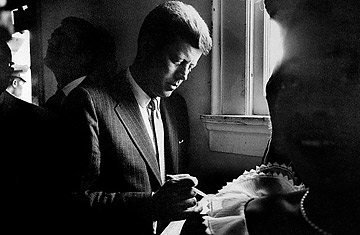
(4 of 7)
Kennedy never again trusted his generals and espionage chiefs after the 1961 fiasco in Cuba, and he became a master at artfully deflecting their militant counsel. "After the Bay of Pigs, Kennedy had contempt for the Joint Chiefs," historian Arthur Schlesinger Jr. recalled over drinks in the hushed, stately rooms of New York City's Century Club not long before his death. "I remember going into his office in the spring of 1961, where he waved some cables at me from General Lemnitzer, who was then in Laos on an inspection tour. And Kennedy said, 'If it hadn't been for the Bay of Pigs, I might have been impressed by this.' I think J.F.K.'s war-hero status allowed him to defy the Joint Chiefs. He dismissed them as a bunch of old men. He thought Lemnitzer was a dope."
President Kennedy never thought much of the CIA either, in part because he and his indispensable brother, Attorney General Robert Kennedy, became convinced that the agency was not just incompetent but also a rogue operation. After the Bay of Pigs—and particularly the Cuban missile crisis—the Kennedys seemed more concerned with defusing Cuba as a political issue at home, where it was a rallying cry on the right, than with actually enforcing a regime change. The darker efforts against Castro—the sinister CIA plots to assassinate him in partnership with the Mafia—began before the Kennedy Administration and continued after it ended. Robert Kennedy—a legendary crusader against organized crime—thought he had shut down the murder plots after two CIA officials sheepishly informed him of the agency's pact with the Mob in May 1962. But there was much that the Kennedys did not know about the agency's more shadowy operations.
"I thought and I still feel that the CIA did wet work on its own," says John Seigenthaler, Robert Kennedy's administrative aide at the Justice Department and later publisher of the Tennessean. "They were way too in thrall to 007... We were caught in the reality of the cold war, and the agency obviously had a role to play. But I don't think the Kennedys believed you could trust much of what they said. We were trying to find our way out of the cold war, but the CIA certainly didn't want to."
Nor did President Kennedy have a firm hand on the Pentagon. "Certainly we did not control the Joint Chiefs of Staff," said Schlesinger, looking back at the Kennedy White House. It was a chilling observation, considering the throbbing nuclear tensions of the period. The former White House aide revealed that J.F.K. was less afraid of Soviet leader Nikita Khrushchev's ordering a surprise attack than he was "that something would go wrong in a Dr. Strangelove kind of way"—with a politically unstable U.S. general snapping and launching World War III.